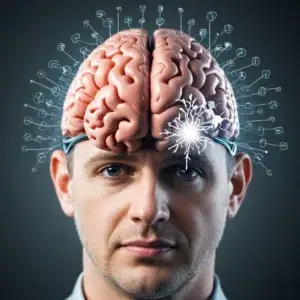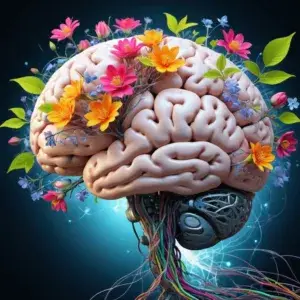Table of Contents – Brain Fog Natural Treatments
Brain fog can be frustrating and disruptive, affecting memory, focus, and overall cognitive function. Stress, lack of sleep, poor nutrition, or even environmental conditions frequently cause brain fog. Fortunately, natural therapies can help to reduce brain fog and sharpen your thinking. Below, we look at effective cures and explain why they work.
1. Optimize your diet.
What you eat has a direct impact on your brain’s performance. Nutrients fuel your brain and promote neurotransmitter function, which is essential for clear thinking and mental sharpness. Diets high in whole foods, such as omega-3 fatty acids, vitamins, and antioxidants can help avoid oxidative stress, which can harm brain cells.
- Omega-3 fatty acids, present in salmon and other fatty fish, are essential for brain cell growth and repair. They also lower inflammation, which can contribute to cognitive decline.
- Antioxidants found in berries and leafy greens combat oxidative stress and protect neurons from damage.
- Vitamins B6, B12, and folate (found in eggs, legumes, and leafy greens) help lower homocysteine levels, which can induce brain fog when accumulated in the body.
Tip: Including nuts, seeds, lean meats, and colorful fruits and vegetables in your diet will greatly improve brain clarity over time.
2. Stay hydrated.
Your brain is around 75% water, so being hydrated is critical for healthy cognitive performance. Even minor dehydration can cause confusion, memory issues, and difficulty concentrating, which are all signs of brain fog. Water helps your body eliminate toxins and transport nutrients to brain cells.
Water conducts electrical signals in the brain, allowing neurons to communicate effectively. Dehydration delays these processes, leading to sluggish thinking and fatigue. Hydration also regulates blood pressure, ensuring that oxygen-rich blood reaches the brain.
Tip: Carry a water bottle with you all day and aim for 8-10 glasses of water. If you struggle to drink plain water, try adding a piece of lemon or cucumber for flavour.
3. Get Regular Exercise.
Active living benefits your body and brain. Exercise boosts blood flow to the brain, supplying oxygen and necessary nutrients while also encouraging the formation of new brain cells, notably in the hippocampus, which is essential for memory and learning.
Exercise stimulates the release of brain-derived neurotrophic factor (BDNF), a protein that protects existing neurons and promotes the creation of new ones. Physical activity also reduces stress hormones such as cortisol, which can impair memory and focus.
Tip: A combination of aerobic exercise (such as walking, jogging, or swimming) and strength training is best for long-term cognitive health. Even 20 minutes of movement per day can significantly improve brain clarity.
4. Prioritize sleep.
Sleep is the brain’s natural means of rejuvenating itself. During sleep, your brain consolidates memories, processes information, and eliminates metabolic waste that accumulates during the day. Cognitive skills such as attention, memory, and decision-making suffer when there is insufficient sleep.
Sleep helps to remove toxins such as beta-amyloid plaques, which are linked to Alzheimer’s disease. It also aids the glymphatic system, the brain’s waste-clearance mechanism that eliminates toxic proteins and cell debris. Consistent sleep patterns increase the release of melatonin, a hormone that regulates brain function.
Tip: Aim for 7-9 hours of sleep each night. Creating a calming evening ritual, such as reading, practicing yoga, or limiting computer time, can help you fall asleep faster and sleep better.
5. Take Brain-Boosting Supplements.
Supplements can be a simple approach to promote brain health and relieve brain fog, especially if your diet is deficient in specific nutrients. Several natural nootropics (brain-enhancing chemicals) have been shown to increase mental clarity and memory, and minimize fatigue.
- Bacopa Monnieri is known for improving memory retention and cognitive performance by promoting neuronal transmission and lowering oxidative stress.
- Lion’s Mane Mushroom: Promotes the production of nerve growth factor (NGF), a protein required for brain cell upkeep and regeneration.
- Rhodiola Rosea is an adaptogen that helps the brain deal with stress by lowering mental tiredness and increasing focus.
- Ginkgo Biloba: Increases blood flow to the brain, enhancing concentration and memory, and acts as an antioxidant to protect neurons.
Tip: To see obvious results, take these supplements consistently for many weeks. Consult your doctor before beginning any supplement regimen.
6. Practice mindfulness meditation.
Mindfulness Meditation is the discipline of remaining in the present moment without judgment. It helps your mind focus, reduces stress, and increases general mental clarity. Over time, mindfulness can physically alter the brain by increasing gray matter density in areas associated with learning, memory, and emotional control.
Meditation reduces cortisol levels and manages stress, which can cause brain fog. By focusing on the present, mindfulness helps to stop the cycle of overthinking and mental clutter, enabling the brain to relax and refresh.
Tip : Start modest, with 10-15 minute sessions per day. To help you stay consistent, use guided meditation apps such as Headspace or Calm.
7. Detox Your Environment
Toxins from the environment can sometimes cause brain fog. Air pollution, home pollutants, and mold can all impair cognitive function. Toxins accumulate in the brain over time, causing inflammation, oxidative stress, and brain fog.
Improving indoor air quality can lower the stress on your body’s detoxification mechanism, allowing for more energy and resources for brain function. Reducing exposure to harsh chemicals can also aid in reducing neuroinflammation, a condition associated with cognitive difficulties.
Tip: Use air purifiers and natural cleaning products instead of synthetic fragrances. You can also add plants to your home to help filter the air organically.
What to Avoid: Habits That Accelerate Brain Fog
In addition to applying the therapies outlined above, it is critical to avoid certain practices that could worsen brain fog. Here’s what to look out for:
1. Sugar and Refined Carbohydrates – Excess sugar and refined carbs cause blood sugar spikes and falls, leading to poor concentration and tiredness. They also contribute to insulin resistance, which can reduce brain function over time.
Tip: Opt for whole grains, fruits, and healthy fats to stabilize blood sugar levels.
2. Chronic stress – Prolonged stress can elevate cortisol levels, which impairs the hippocampus, the brain’s memory center. It also promotes inflammation, which can worsen brain fog.
Tip: To handle chronic stress, use stress-relieving activities such as yoga, journaling, or nature walks.
3. Excessive caffeine – Caffeine can provide a momentary increase in alertness, but excessive use can lead to dependency, crashes, and even anxiety, which exacerbates brain fog. Too much caffeine also interferes with sleep, exacerbating cognitive problems.
Tip: Consume caffeine in moderation (1-2 cups per day) and avoid it late in the afternoon.
4. Sleep deprivation – Not getting enough sleep is a guaranteed way to exacerbate brain fog. Poor sleep lowers the brain’s ability to eliminate waste products, impairing focus, memory, and decision-making.
Tip: Make consistent, quality sleep a priority by developing a relaxing nightly ritual and adhering to a regular sleep schedule.
5. Excessive consumption of processed foods – Highly processed foods are generally devoid of important nutrients and filled with unhealthy fats, preservatives, and artificial chemicals. These can have a negative impact on brain function, causing inflammation and oxidative stress, which exacerbates brain fog.
Tip: Choose whole, less processed meals whenever possible.
Clear Your Mind with Natural Remedies
Brain fog can be crippling, but by making simple changes to your nutrition, lifestyle, and everyday habits, you can drastically lessen it. Prioritizing sleep, eating nutrient-dense foods, staying hydrated, and engaging in regular exercise are all effective approaches to naturally prevent brain fog. Also, avoid habits and drugs that can exacerbate mental weariness, such as sweets, processed foods, and sleep deprivation. These remedies, when used consistently and diligently, will help you gain greater mental clarity and sharper focus.
References
- Omega-3 Fatty Acids and Brain Function
Calder, P. C. (2017). Omega-3 fatty acids and inflammatory processes: from molecules to man. Biochemical Society Transactions, 45(5), 1105-1115.
Link - Antioxidants and Brain Health
Joseph, J. A., Shukitt-Hale, B., & Lau, F. C. (2007). Fruit polyphenols and their effects on neuronal signaling and behavior in senescence. Annals of the New York Academy of Sciences, 1100(1), 470-485.
Link - Hydration and Cognitive Performance
Benton, D., & Burgess, N. (2009). The effect of the consumption of water on the memory and attention of children. Appetite, 53(1), 143-146.
Link - Exercise and Brain-Derived Neurotrophic Factor (BDNF)
Cotman, C. W., & Berchtold, N. C. (2002). Exercise: a behavioral intervention to enhance brain health and plasticity. Trends in Neurosciences, 25(6), 295-301.
Link - Sleep and Cognitive Health
Xie, L., Kang, H., Xu, Q., et al. (2013). Sleep drives metabolite clearance from the adult brain. Science, 342(6156), 373-377.
Link - Bacopa Monnieri and Cognitive Performance
Peth-Nui, T., Wattanathorn, J., Muchimapura, S., et al. (2012). Effects of Bacopa Monnieri on cognitive function, attention, and working memory. Journal of Ethnopharmacology, 141(3), 793-799.
Link - Lion’s Mane Mushroom and Brain Health
Mori, K., Obara, Y., Moriya, T., & Inatomi, S. (2009). Effects of Hericium erinaceus (Lion’s Mane) on mouse hippocampal neurogenesis and spatial short-term memory. Biomedical Research, 30(5), 162-167.
Link - Rhodiola Rosea and Mental Fatigue
Shevtsov, V. A., Zholus, B. I., Shervarly, V. I., et al. (2003). A randomized trial of two different doses of a SHR-5 Rhodiola rosea extract on the fatigue of students during an examination period with a repeated low-dose regimen. Phytomedicine, 10(2-3), 95-105.
Link - Ginkgo Biloba and Cognitive Function
Tan, M. S., Yu, J. T., Tan, C. C., et al. (2015). Efficacy and adverse effects of Ginkgo Biloba for cognitive impairment and dementia: a systematic review and meta-analysis. Journal of Alzheimer’s Disease, 43(2), 589-603.
Link - Mindfulness Meditation and Brain Structure
Hölzel, B. K., Carmody, J., Vangel, M., et al. (2011). Mindfulness practice leads to increases in regional brain gray matter density. Psychiatry Research: Neuroimaging, 191(1), 36-43.
Link - Processed Foods and Cognitive Decline
Beilharz, J. E., Maniam, J., & Morris, M. J. (2016). Diet-induced cognitive deficits: the role of fat and sugar, potential mechanisms and nutritional interventions. Nutritional Neuroscience, 19(1), 79-86.
Link - Caffeine and Its Effects on the Brain
McLellan, T. M., Caldwell, J. A., & Lieberman, H. R. (2016). A review of caffeine’s effects on cognitive, physical, and occupational performance. Neuroscience & Biobehavioral Reviews, 71, 294-312.
Link







